Interview: 'It's Very Emotionally Intense': Actor Aaron Sidwell on Playing Bill Sikes in OLIVER!
'I choose with Bill to find stillness in moments, to make his action much more explosive than just a continued state of anger.'
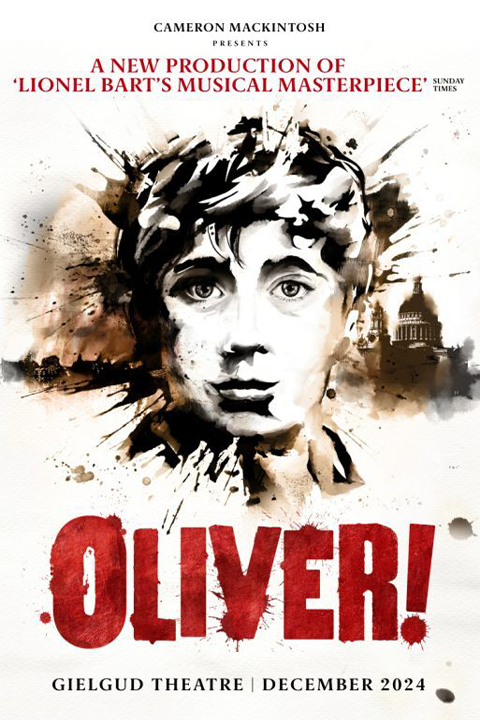
|
|
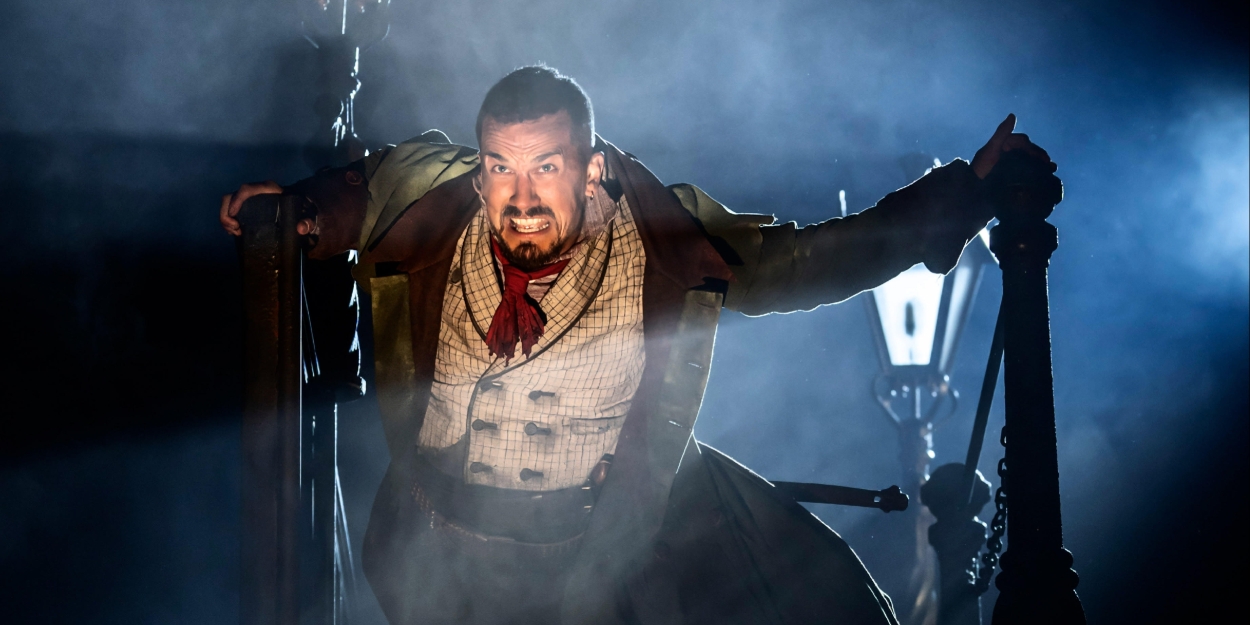
After a sold out run at the Chichester Festival Theatre earlier this year, Oliver! is returning to the West End at the Gielgud Theatre. The new production, with book, music and lyrics by Lionel Bart, has been revised by Cameron Mackintosh and renconceived by director and choreographer Matthew Bourne, who is best known for reinventing a range of classical works including Swan Lake and Edward Scissorhands.
BroadwayWorld sat down with Aaron Sidwell, who takes on the infamous role of Bill Sikes. We discussed what made him want to be involved in Oliver!, how he is able to take on such an emotionally demanding role and what makes this production so special compared to previous versions of the musical.
How did you first get started in the world of theatre?
I started doing theatre when I was young - I think that most people have to, in this country. If you have any kind of interest or aptitude in performance, in any way, then a lot of the time you'll start doing theatre. So I did theatre in that way. And so when I first started working in TV, I felt quite like a fish out of water, as opposed to when I first started doing theatre. Then when I left the TV show that I was on, I started to get a lot more auditions for theatre and the ball started rolling from there!
And what made you want to be a part of this production of Oliver!?
The fact that it's a reconceived production. I use that term lightly because we are still doing Oliver! - we haven't torn up Dickens' text or Lionel Bart’s score and changed everything. But there was a desire to find something new with all the characters. It felt less like being part of an established, long-running show and more like something you would do more commonly in a regional theatre, where there's guidelines to work within, but really, there's a lot of scope to play. It felt more like that, even from the audition stage, than I had expected. And so through auditions, that really opened my mind up to doing it.
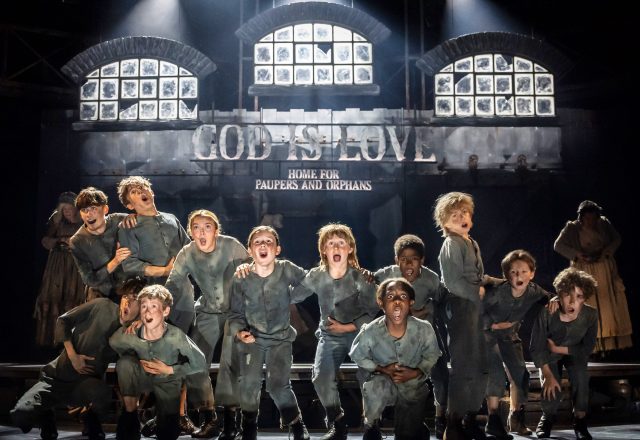
Photo Credit: Johan Persson
What is it like taking on the kind of infamous role of Bill Sikes?
With any role like this, that's so attached to one specific actor in the eyes of so many people . . . I mean, Bill's been played by hundreds of actors all over the world. But really, when you say Bill Sikes, people think of Oliver Reed. I hadn't anticipated how tricky that can be when putting that in front of an audience. Some people have a very specific idea in mind of not just what villains can be, but what specifically this villain has been in the past. And so whenever you're reinventing something that's thought of in that regard, it has its tricky areas, but the beauty for me is that I am able to bring something to it in the way that I see it.
Hopefully, people have liked that so far and will continue to like that! But it definitely has its challenges. People would argue that really, when you think of Oliver!, you think of Oliver Reed a lot of the time. Ron Moody was fantastic, people do think of him as well, but I really think that when it comes to Bill Sikes, people immediately jump straight to Oliver Reed. So it has its challenges in that regard.
And so did you watch the film before rehearsals, or did you choose to keep your interpretation separate from it?
No, it wasn't a case of keeping separate. Even in the film, it's very different to how it is in a stage show. He [Bill Sikes] doesn't have a song. There are different ways that he's introduced, a different way of introducing him and Nancy . . . You see more interaction with Oliver with Bill in the film. So even the film itself, it's really different. So I did watch the film. I wasn't someone that grew up with this show. There are people in the cast who did - it was either their first show that they watched or they did it as a kid. I never did it as a kid, I never watched it as a kid. So I really only watched it as an adult...There are parts of Bill's journey and relationships he has with certain people that aren't there. So how do we capture that in order to tell the full story?
So you were with the show at the Chichester Festival Theatre earlier this year. Were you able to develop your role with the creative team?
Oh, yeah! ...There were no wrong answers. There were no bad ideas. There was stuff that worked and there was stuff that didn't work, but what the audience will see on stage is very much collaboration between the artists. And not just the director and musical supervisor, but also Cameron [Mackintosh] himself - he had a lot of input and really great creative ideas without being the director or stepping on the director's toes. He had some real input to the overall arc of people's journeys or even very little intimate moments and how they could kind of come to life.
So what the audience will see is very much a collaboration. Matthew [Bourne] was superb at going, “I've employed these actors for a reason. I like what they bring and I want them to bring it,” rather than getting too hands-on. He sat back and allowed things to happen, and then we just finessed certain beats. So everyone in the show feels a huge ownership about what they're doing, which is really nice.
That's interesting, especially given it's such a classic musical! Typically, you have to go beat by beat, but it seems like this is giving you quite a bit more freedom.
So much more freedom! It was much more like working on a play, even the way that the designers have done the lighting and stuff. It's never really overly specific or pinpointed, so you have space and freedom to move within the scene at any given time. Unless you're really extreme, you're never stepping out of the light. So it allows you the licence to go with an instinct at any given time.
And what is it like to be bringing this production of Oliver! to the West End?
I didn't really have a massive relationship with the show prior to doing it, so I was quite taken aback and surprised by not just the response we had in Chichester - you couldn’t get a ticket! - but that has now translated to London. And obviously, that's just me underestimating the draw of the show! But over the years, with it having such star name casting, you go, “Well, are people going to see Rowan Atkinson, or are they going to see Oliver!?” And certainly, the advance on Oliver! is showing is that actually people really want to see the show. As wonderful as I think my costars are, there's no big-name draw that's taking away from the overall piece.
People are booking tickets because they want to see Oliver!, so it's really nice to feel like you're part of something that people are eagerly awaiting and anticipating, as opposed to people going, “Hmm . . . I wonder how that will go. Let's go and watch to see if it falls in on itself.” People are coming because they really love this show and want to see it, so that's nice.
And so what is it like to be in a classic musical like Oliver! compared to more modern ones you've been in, like American Idiot and Loserville?
It's very different! There are things I love about the two. I think the difficulty with modern musical theatre a lot of the time is that it tends to base itself on one specific genre or theme. And I don't think the classical musicals do, which is why I think we keep seeing them redone.
And just listening to the orchestra warming up, or having that be what’s backing you . . . These musicians are so perfect with their playing, you'd be mistaken as an actor for assuming it's a click track! It's so precise every single night that sometimes you forget that underneath your feet is just this enormous orchestra conducted by the wonderful Graham Hurman. So there's that part of it. When those first few chords at the top of the show, there's something so legitimate about what you're doing and this enormous team of people that are creating it - I love that element of it. There's an intimacy when you're doing a new piece. In American Idiot, there was a four-piece band and we had a bit of click running. but it was four-piece. This, there's like twelve people added to it. It feels so grand when you're doing something so traditional!
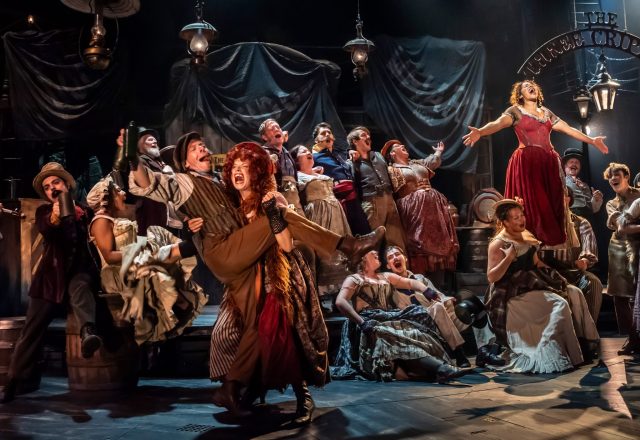
Photo Credit: Johan Persson
You're putting a lot into this emotionally heavy role. How do you deal with that when playing a role like this?
The relationship that we have developed between our versions of Bill and Nancy [played by Shanay Holmes], particularly, it's very emotionally intense in every direction. It's not a Bill Sikes that emotionlessly hits people to make them do the things that he wants to do. He reacts, and finding that spark to make you react every single night is really tough. Obviously, I don't want to ruin it for anybody that hasn't seen it, but the end of our journey, particularly for myself and Shanay, is really hard. I leave the stage every single night feeling like I've done American Idiot, and that was ninety minutes of me just in my underwear taking drugs! [Laughs]
It feels like that because we have chosen - rightly so, in our viewpoint - to commit at the level we commit, particularly emotionally. And so it's tough, but it's also so fulfilling in the sense that I don't think any of us could ever walk through the show. We have to bring it a game every single night, which is incredibly challenging.
And can we look forward to Bullseye making an appearance?
It depends on how you define making an appearance!
Ooh!
We really use the full brilliance of the whole team working on this show to bring to life every element, whether it's transporting people to different parts of the country, from the workhouse to London - everyone is involved in that. From doing their work on the soundscape that Adam [Fisher, Sound Designer] does and then George [Reeve, Projection Designer] with all the video projection, there are ways and means of bringing about things like Bullseye that aren't necessarily literal. They're inspiring people to suspend their disbelief at times. So yes, Bullseye will make an appearance, but not necessarily in the way you think he will, which is quite nice.
What is it like performing for the stage versus the screen? Do you find you have a preference?
I definitely don't have a preference because they are very different. I think there's a level of commitment that comes with theatre that you just don't have with screen. With theatre, you really have to think, “Okay, I want to do this. Can I sustain that eight times a week? Maybe not.” There's a more chaotic energy about performing for camera, because really, anything goes.
You have to be a bit more methodical in theatre. Not to say that there's not still inspiration and creativity any given night in the theatre, but you do have to engage that psychologically when you're doing those things. And then from a technical point of view, obviously it's different. There are roles that lend themselves better to screen than to stage. Sometimes, it can be easier to play certain types of villains. I choose with Bill to find stillness in moments, to make his action much more explosive than just a continued state of anger. It's much more surprising and shocking when certain things in the show happen if it's like that.
Do you have any favourite scenes or songs from the show?
We have a new scene in the show that has been written for this production between Bill, Nancy and Fagan, and I love that scene. It shows a different side to all of those relationships. And it's the first time you see Bill and Nancy, so it allows us to set up a relationship - there's never been the ability to do that within the musical before. It's not necessarily driving the narrative of Oliver's journey. It is just more about establishing character, so I love that scene.
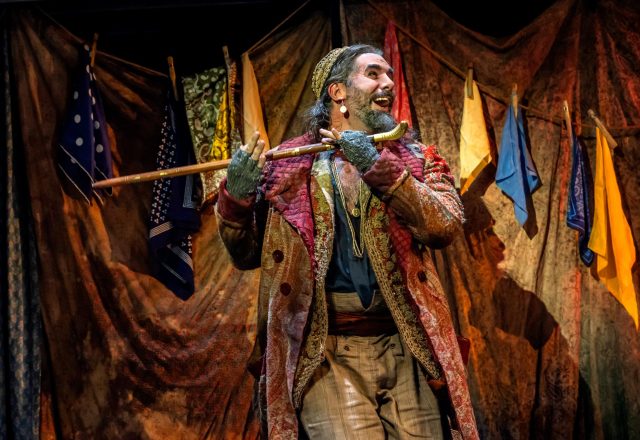
Photo Credits: Johan Persson
Music . . . It’s obviously not going to be anything that I sing! I really love “You’ve Got to Pick a Pocket or Two.” I'm preparing at that point, so I don't necessarily hear it every single night, but I love the song. I also love Simon's performance within the song as well. I was watching some of it yesterday, and I was like, “Oh, yeah, I never watched this! I’ve never heard this part!” [Laughs] It just takes me back every single time. It surprises me and I love it! It's great.
What do you hope audiences take away from this production of Oliver!?
The idea, obviously, with anything, is to entertain. So I really hope they come in and they're entertained by it. There's a level of talent on stage and off I hope people appreciate. The kids are just sensational! My kids are actually of a similar age to the kids in the show, and I love my kids, and I do just look at these kids, and I just go, “My God!” They're just in a different stratosphere or universe, whether it's their attitude to work or ability to stand up in front of - as we were in Chichester - 1,300 people. And they're not doing it every night! Sometimes they have a whole week where they're not on the show and they just turn up and slot right back in. I just think, “I couldn't do that at that age!”
And the way they interact with us as well - they're so articulate for eleven-year-olds. [Laughs] They're a joy to work with and they're a joy to watch. But everyone across the board, backstage and the creative team that put those elements of the show together, I hope people come and appreciate it in that regard.
It’s not a spectacle, Oliver!. It is much more about the music and the story. There's no huge set pieces flying in or things like that. It really is just the classic “focus on the story and the songs” type of show and I really love that about it. Being able to stage this production in a theatre like the Gielgud is amazing.
I hope people appreciate the intimacy that we are able to bring and the intimacy between characters with the audience being so much more in the story in terms of distance from the stage. hope they take that away and appreciate that element of it.
And finally, how would you describe Oliver! in one word?
Honest. There's just honesty to it, the situations that people were living in and dealing with the brutality of living in that time. It's quite unique in the regard that we don't really depict anybody from great finance, other than Mr Brownlow. It really is about the seedy underbelly of life at that time, so there's an honesty about Oliver! and Dickens in general.
Oliver! is currently booking until 28 September 2025 at the Gielgud Theatre
Photo Credits: Johan Persson
Comments

Videos

